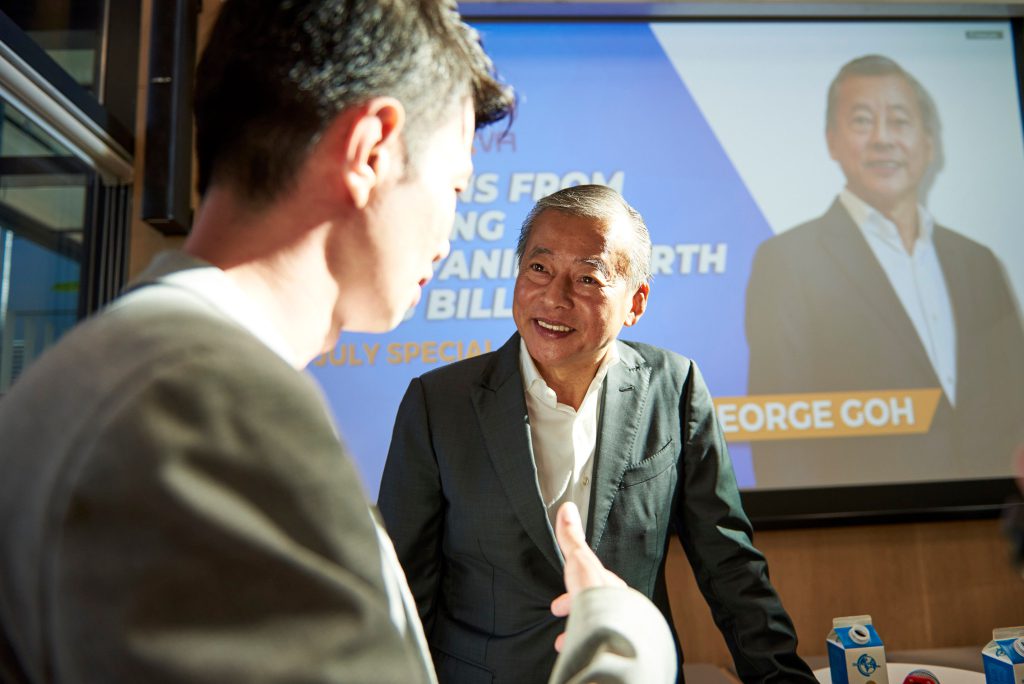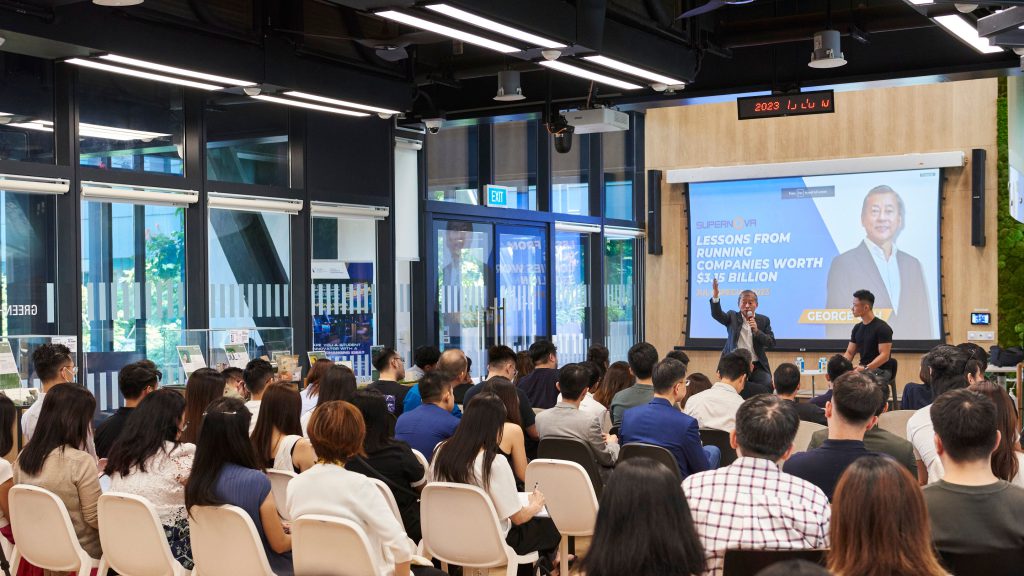Know when to call it quits: Presidential hopeful George Goh shares business advice
The rule of thumb in entrepreneurship is knowing when to call it quits and cut your losses, presidential hopeful George Goh said. He explained that in business, prioritising face value will only lead to more losses.
On Monday (July 10), George spoke to an audience of over 100 entrepreneurs during a fireside chat organised by entrepreneurship coaching firm Super Scaling at the Singapore Management University.
Last month, the 63-year-old founder of Harvey Norman Ossia and chairman of SGX-listed Ossia International, declared his candidacy for the presidency.
He is the second person to put himself in the running after former Senior Minister Tharman Shanmugaratnam, who stepped down from his government positions on July 7.
From humble beginnings to successful entrepreneur
Born without a silver spoon, George came from a family of nine children. He started off as a shoemaker in his teenage years, before embarking on his first business venture — shoe manufacturing.
In his 40 years of entrepreneurship since, George has owned over 100 companies across Asia Pacific, Europe and the United States.
By the age of 48, he owned seven companies that were publicly listed on various countries’ stock exchanges across Singapore, Australia and the United Kingdom with an approximate total market capitalisation value of S$2.8 billion.
He also has considerable business experiences in sole proprietorships, start-ups, e-commerce, venture capitalism, and franchising.
George is also a strong believer in mentoring young entrepreneurs and serving the underprivileged. Together with his wife Lysa, he established Border Mission in 2014, a non-profit organisation dedicated to empowering the most needy both in Singapore and the Himalayas.
Then in 2017, George was appointed the Singapore Ambassador to the Kingdom of Morocco, and is currently serving his second term. He also serves as an Advisor of the Moroccan Chamber of Commerce.
George holds esteemed positions in the academic realm. He serves as an Adjunct Professor and Honorary Advisor at BML Munjal University, where he is also the founder and chairman of the Institute of Innovation and Entrepreneurship.
Additionally, George holds the roles of Adjunct Professor, founder, and First Vice Chairman of the Institute of Innovation and Entrepreneurship at Tribhuvan University in Nepal. Furthermore, he is an Honorary Advisor to the Vice Chancellor of the Royal University of Bhutan.
Perfect English is not a requirement
George reiterated during the fireside chat that you do not need to speak perfect English to pitch and do a business. Rather, he said that authenticity and sincerity matters more.
“When you want to sell to a billionaire, don’t speak too well. Sorry I teach you the wrong way,” he joked.
George cited how his less-than-perfect English may have worked in his favour when he pitched to prospective partners, such as Harvey Norman co-founder Gerry Harvey, as it came across as more authentic.
In fact, he has persuaded successful businessmen such as Harvey to become his partners because his body language and pitches communicated sincerity.

“If you cannot sell by language, it doesn’t matter… You must understand that when I communicate with you, there’s another word called body language — body language to show your sincerity,” George said, adding that displaying good character and a sound understanding of the business’ cost structure are more important.
On that note, he highlighted that a good command of English is insufficient to thrive in the business world if that is the only language a businessman knows.
In reiterating the importance of knowing multiple languages, George said that he knows some Hakka, Bahasa, and that his minnan yu (Taiwanese Hokkien) opened doors when he sought international business partners.
“If you speak English, (others) will understand, but they prefer their own language – the working language. As a businessman, we have to master not only one language. We have to master a few,” George explained.
Always be hungry for knowledge
Another key advice he imparted to the audience was to constantly educate oneself, and not assume that one solution fits all.
When asked about the differences in George’s methods in running a small business compared to a much larger business now, he drew a link to the recent changes in the criteria for Singapore’s presidential election.
Specifically, the minimum financial threshold for presidential candidates under the private sector service was raised from S$100 million in paid-up capital to S$500 million in shareholder’s equity in 2016.
George shared that others have said if they can run a S$100 million company, they can run a S$500 million one, which is far from true.
“If you run a million-dollar (versus) a S$500 million (business), your system is slightly different, your internal structure – from the HR to your finance department, sales and marketing department – and even your compliance are quite different,” he explained. He also drew an analogy to buildings, saying that the structure and foundations of a 10-storey building are different from those of a 50-storey building.
During the fireside chat, George expressed his strong belief in the importance of small and medium-sized enterprises (SME) banks. He discussed how he personally experienced significant benefits through the support of SME banks, which played a crucial role in his success thus far.

In response to a question from the audience about the vitality of integrating environmental metrics and corporate social responsibility (CSR) into a business, George said that these were difficult tasks for SMEs, which operate “hand-to-mouth” and have tight cash flows, especially during the first few years of business.
George added that Singapore’s banking system, dominated by the three main local banks, contributed to SMEs’ funding challenges.
Elaborating on this, George said that when businesses try to get capital from the three ‘big boys’, it is very difficult to get funding unless they have a huge asset base to mortgage to the bank. He cited the now-defunct Keppel Bank, Tat Lee Bank and Overseas Union Bank as examples of smaller banks that used to exist in Singapore’s financial ecosystem.
“Because they’re a big institution, big machinery, they take up all the money… We must have an SME bank. Now we don’t have this. So (it) all depends on the three big banks. This is not a healthy structure,” he said.
At the end of the day, George expressed his desire to inspire participants to achieve success even if they are not born with a silver spoon, just like himself.
“I’ll be very happy if five (or) 10 years down the road, someone here tells me (they) became successful because they picked up the lessons here.”
Featured Image Credit: Ed Cheong
For all the latest Life Style News Click Here
For the latest news and updates, follow us on Google News.
